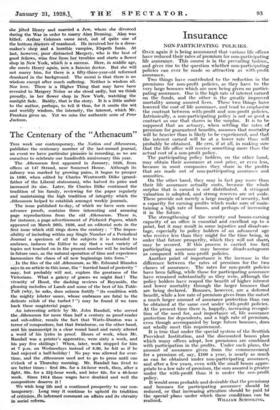The Centenary of the "Athenaeum' ,
This week our contemporary, the Nation and Athenaeum, publishes the centenary number of the last-named journal, an event we have particular pleasure in recording, as we are ourselves to celebrate our hundredth anniversary this year.
The Athenaeum first appeared in January, 1828, from offices at 147 Strand, near Somerset House. Although its infancy was marked by growing- pains, it began to prosper in 1830, when edited by Charles Wentworth Dilke (grand- father of the Liberal statesman), who halved its price and increased its size. Later, Sir Charles Dilke continued the tradition of his family, 'reviewing for the paper regularly and maintaining the high tradition of integrity which the AthenaeuM helped to establish amongst weekly journals.
The issue published to-day, of which we have seen some advance proofs, contains three interesting and amusing page reproductions from the old Athenaeum. There is, for instance, a page advertisement of Pickwick Papers, which appeared on March 26th, 1836, and an editorial note in the first issue which still rings down the century : "The impos- sibility of including within any Single Number of a Periodical Journal a specimen of all the subjects it is intended to embrace, induces the Editor to say that a vast variety of topics not touched on in the present number will be included in future ones, as the natural operation of time and experience harmonizes the chaos of all new beginnings into form."
In the files of the old Athenaeum, as Mr. Edmund Blunden says in an article in this issue, the " hurried hand of posterity" may, but probably will not, explore the greatness of the Victorians. What a galaxy of graces we might find The vivacity of Hood, the dashing reviews of Reynolds, the pleasing melodies of Lamb and some of the best of his Table- Talk (why, he asks, does salmon fortify "its condition with the mighty lobster sauce, whose embraces are fatal to the delicate relish of the turbot ? ") may be found if we turn back these magisterial pages.
An interesting article by Mr. John Randall, who served the: Athenaeum for more than half a century as proof-reader and sub-editOr, recalls the fact that Watts-Dtmton was a terror of compositors, but that Swinburne, on the other hand, sent his manuscript in a clear round hind and rarely altered a w6id -of his lyrics in proof. Hours of work, when Mr. Randall was a printer's apprentice, were sixty a week, and his pay five shillings ! When, later, work stopped for him at 7 p.m. on Wednesdays instead of 8.80, he felt as if he had enjoyed a half-holiday ! No pay was allowed for over- time, and the Athenaeum used not to go to press until one o'clock of a Thursday morning. Mr. Randall has lived to See better times : first 88s. for a 54-hour week, then, after a fight, 89s. for a 52i-hour week, and later 42s. for a 48-hour week. Since 1914 these wages have doubled and well the compositors deserve it I We wish long life and a continued prosperity to our con- temporary. Long may it continue to uphold its triidition of criticism,its informed comment on affairs and its chivalry in social reform,






































 Previous page
Previous page